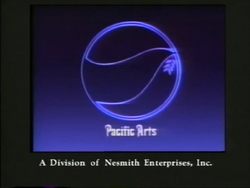Background: Pacific Arts is a multimedia company started by former member of The Monkees, Michael Nesmith, in 1974. By the 1980s, the company grew to have what was at the time the largest video catalog of non-theatrical films, as well as several music artists on its roster and being one of the earliest pioneers of the home video industry. In 1990, the company struck a deal with PBS to distribute their titles on video; unfortunately, the two companies would wind up facing many disagreements over many issues (including royalties, misrepresentation, and breach of contract) that would eventually end in several lawsuits. Due to the cost of litigation, the company was forced to cease operations in the mid-1990s, though they did not go defunct altogether. While Pacific Arts would wind up winning the lawsuit in 1999 and the company does still exist today, Nesmith was extremely disappointed in the whole ordeal (stating famously, "It's like finding your grandmother stealing your stereo. You're happy to get your stereo back, but it's sad to find out your grandmother is a thief."), and stated he likely wouldn't go back to the video business.
Pacific Arts[]
1st Logo (1981-1989)[]
Nickname: "Drawing Dove Logo"
Logo: On a black background, we see a neon blue-outlined circle. Then, we see a second neon blue outline forming a dove, then some leaves flash. "The Pacific Arts Corp, Inc." in an Old English font fade in under the circle.
Later Variant: The magenta gradient rises from the bottom, before the logo's animation.
Later Sub-Variants:
- The magenta floor appears on the black background, which rises into the magenta gradient a split-second later. The logo animates as usual, with the shadowed reflection at the bottom (except for the text).
- Sometimes, the leaves appear to be green.
FX/SFX: The light drawing.
Music/Sounds: None.
Availability: Scarce. Seen on movies from the era like The Official Story (La Historia Official). The one with the magenta background can be seen on Tapeheads as well as Heaven.
2nd Logo (1989-1994)[]
Nickname: "Drawing Dove Logo II"
Logo: We start out on a black-blue gradient background, usually with the text:
and
distributed
exclusively
by
on it. Then, after the text disappears we see the animation in the 1st logo, complete with the text in the same Old English font fade in, except it simply reads "Pacific Arts".
Variant:
- At the end of early VHS tapes carrying the logo, the logo would zoom out a little into a box on a black background and the text "A Division of Nesmith Enterprises, Inc." would fade in under the logo.
- Late in the logo's life, "Pacific Arts" is in a different, serif font.
- At the end of later VHS tapes, the above variant is used, except "ONE OF THE NESMITH ENTERPRISES" fades in below.
FX/SFX: The text appearing and disappearing, the animation from the first logo.
Music/Sounds: A wind chime tune with a ping at the end. On the VHS release of Computer Visions, it's silent.
Availability: Rare. It can be seen on PBS Home Video releases, as well as the VHS of Fear in the Dark, On Any Sunday and Monkey House. Tapes with this logo originally came in the same style of packaging as the previous logo, but it was later replaced by the normal print logo (without the TV tube) with the words "Pacific Arts Video" on the right of the dove.
Pacific Arts Video Records[]
Note: This label was used to release special interest and exclusive videos.
(1984-Late 1980's)[]
Nicknames: "Drawing Dove Logo III", "Changing Logo"
Logo: We start out with the drawing of the 1st logo on the black background. After it stops drawing, the dove turns gray inside the circle inside a TV tube with a multi-colored filmstrip on the top half and multi-colored bars on the bottom half shown on a white background. The text "PACIFIC ARTS VIDEO RECORDS" is under the TV tube.
FX/SFX: The drawing from the first logo, the logo change.
Music/Sounds: None.
Availability: Seen on a few VHS tapes from Pacific Arts, like Repo Men. Most tapes carrying the logo on the packaging used the standard Pacific Arts logo.








